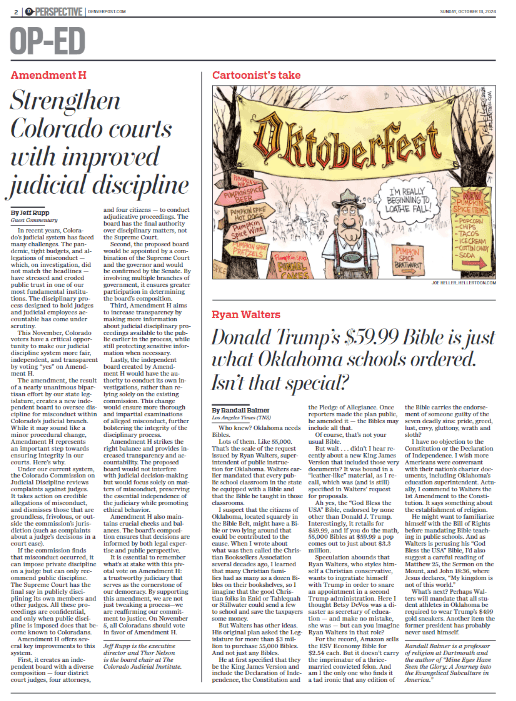
[Note: This CJI op-ed was originally published October 13, 2024, in the print edition of The Denver Post. On October 19 it was posted on the Post's website. Reprinted here with permission.]
In recent years, Colorado’s judicial system has faced many challenges. The pandemic, tight budgets, and allegations of misconduct — which, on investigation, did not match the headlines — have stressed and eroded public trust in one of our most fundamental institutions. The disciplinary process designed to hold judges and judicial employees accountable has come under scrutiny.
This November, Colorado voters have a critical opportunity to make our judicial discipline system more fair, independent, and transparent by voting “yes” on Amendment H.
The amendment, the result of a nearly unanimous bipartisan effort by our state legislature, creates a new independent board to oversee discipline for misconduct within Colorado’s judicial branch. While it may sound like a minor procedural change, Amendment H represents an important step towards ensuring integrity in our courts. Here’s why.
Under our current system, the Colorado Commission on Judicial Discipline reviews complaints against judges. It takes action on credible allegations of misconduct, and dismisses those that are groundless, frivolous, or outside the commission’s jurisdiction (such as complaints about a judge’s decisions in a court case).
If the commission finds that misconduct occurred, it can impose private discipline on a judge but can only recommend public discipline. The Supreme Court has the final say in publicly disciplining its own members and other judges. All these proceedings are confidential, and only when public discipline is imposed does that become known to Coloradans.
Amendment H offers several key improvements to this system.
First, it creates an independent board with a diverse composition — four district court judges, four attorneys, and four citizens — to conduct adjudicative proceedings. The board has the final authority over disciplinary matters, not the Supreme Court.
Second, the proposed board would be appointed by a combination of the Supreme Court and the governor and would be confirmed by the Senate. By involving multiple branches of government, it ensures greater participation in determining the board’s composition.
Third, Amendment H aims to increase transparency by making more information about judicial disciplinary proceedings available to the public earlier in the process, while still protecting sensitive information when necessary
Lastly, the independent board created by Amendment H would have the authority to conduct its own investigations, rather than relying solely on the existing commission. This change would ensure more thorough and impartial examinations of alleged misconduct, further bolstering the integrity of the disciplinary process.
Amendment H strikes the right balance and provides increased transparency and accountability. The proposed board would not interfere with judicial decision-making but would focus solely on matters of misconduct, preserving the essential independence of the judiciary while promoting ethical behavior.
Amendment H also maintains crucial checks and balances. The board’s composition ensures that decisions are informed by both legal expertise and public perspective.
It is essential to remember what’s at stake with this pivotal vote on Amendment H: a trustworthy judiciary that serves as the cornerstone of our democracy. By supporting this amendment, we are not just tweaking a process—we are reaffirming our commitment to justice. On November 5, all Coloradans should vote in favor of Amendment H.
Jeff Rupp is the executive director and Thor Nelson is the board chair at The Colorado Judicial Institute.

